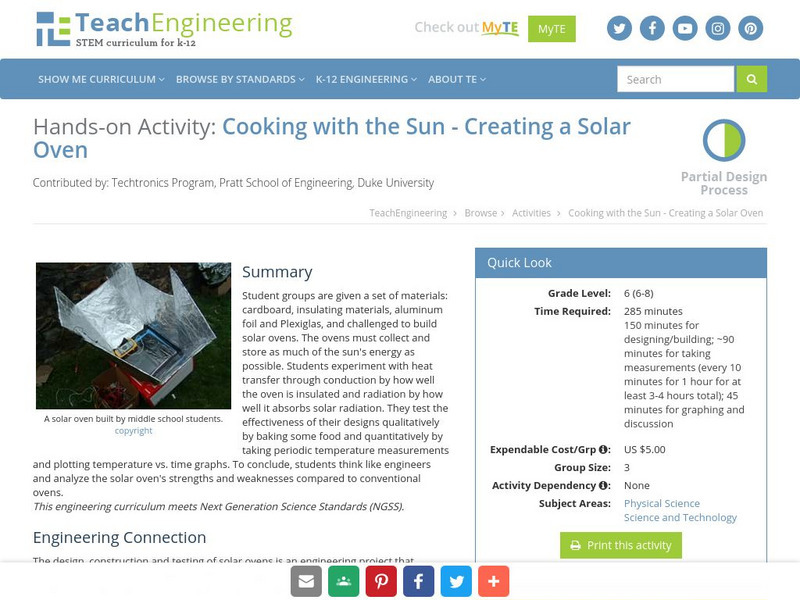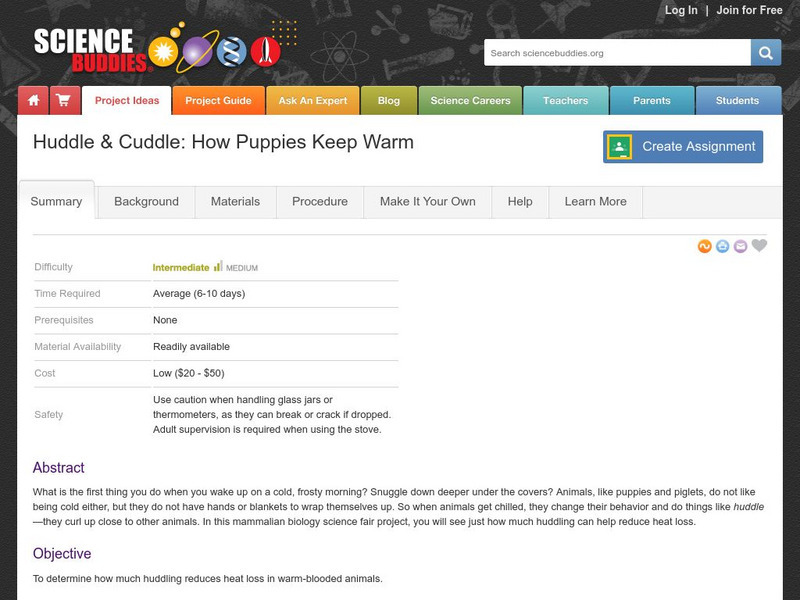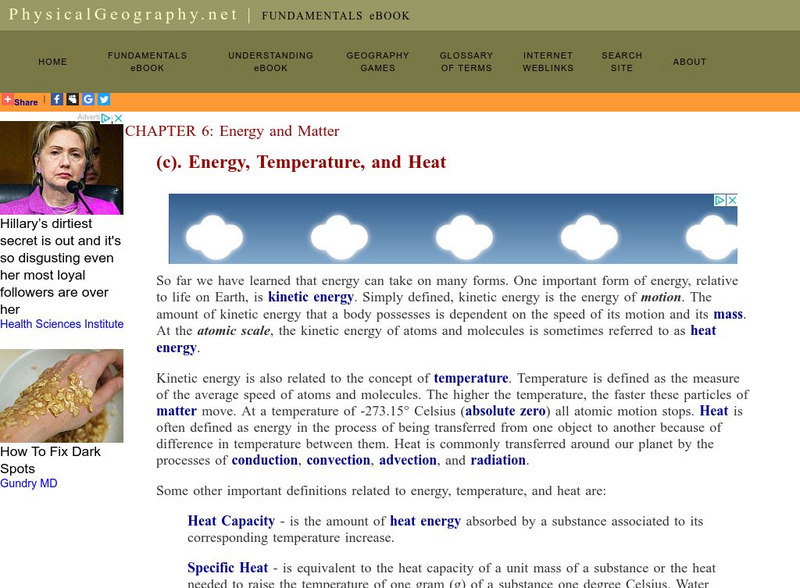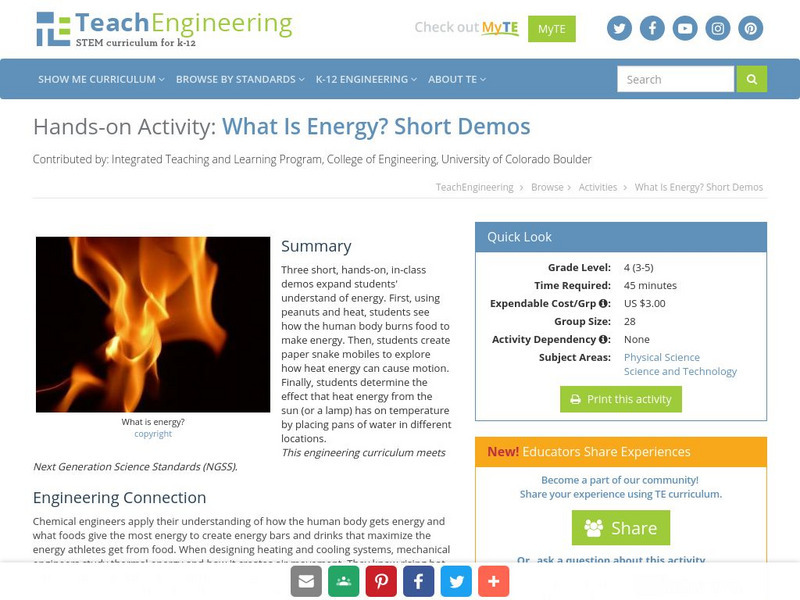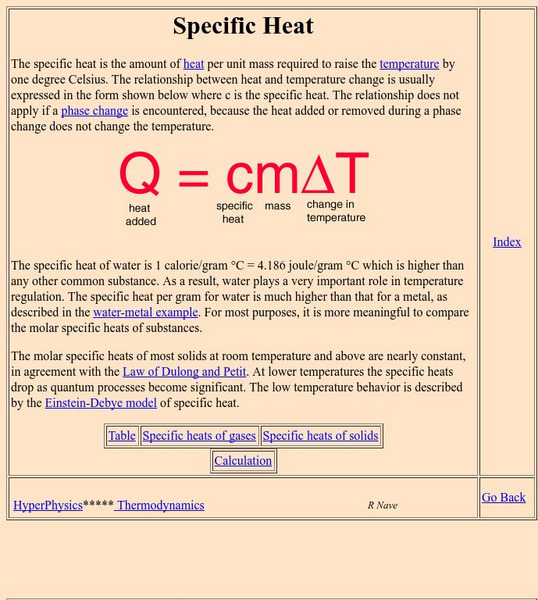Physics Aviary
Physics Aviary: Practice Problems: Heat Transfer Problem
Determine the rate at which heat moves through a barrier that is separating gases at two different temperatures.
TeachEngineering
Teach Engineering: Cooking With the Sun Creating a Solar Oven
For this activity, students will be given a set of materials: cardboard, a set of insulating materials (i.e. foam, newspaper, etc.), aluminum foil, and Plexiglas. Students will then become engineers in building a solar oven from the...
TeachEngineering
Teach Engineering: Let's Get Breezy!
Students apply an understanding of the concept of heat transfer through convection, conduction, and radiation as they use wireless temperature probes to investigate the heating capacity of different materials under heat lamps.
Science Buddies
Science Buddies: Project Ideas: Huddle and Cuddle: How Puppies Keep Warm
In this mammalian biology science fair project, students will determine how much huddling reduces heat loss in warm-blooded animals. The Science Buddies project ideas are set up consistently beginning with an abstract, objective, and...
OpenStax
Open Stax: Convection
In this section of a college textbook, the topic of convection is explored. Understand how the process of convection transfers heat. Also learn how to calculate the rate of heat transfer by convection. Section also includes problems and...
Science Buddies
Science Buddies: Project Ideas: How Horses Keep Warm in the Wind
In this mammalian biology science fair project, students will learn about methods of heat transfer and determine the best direction in which horses should stand in a cold wind to maintain their core temperature. The Science Buddies...
CK-12 Foundation
Ck 12: Physical Science: Heat Conduction
[Free Registration/Login may be required to access all resource tools.] Investigates what conduction is, how it works, and gives examples of conduction.
CK-12 Foundation
Ck 12: Heat Flow
[Free Registration/Login may be required to access all resource tools.] In this lesson, students study the difference between reactions that absorb versus release heat as well as how to measure this change in energy.
University of Sydney (Australia)
Thermal Physics Module: Thermal Expansion [Pdf]
A lengthy set of lecture notes on the topics of thermal expansion and heat absorption. The concept of specific heat capacity is explained and numerical examples are discussed. Heats of transformation (fusion, vaporization) are explained...
University of Sydney (Australia)
Thermal Physics Module: Refrigerators and Heat Pumps [Pdf]
Refrigerators and heat pumps are described. Their operation is explained and the variables which improve their efficiency is discussed.
University of Sydney (Australia)
Thermal Physics Module/temperature and Heat [Pdf]
A lengthy set of lecture notes on the distinction between heat and temperature. The science of thermography is introduced; the Kelvin temperature scale is explained and compared to the Celsius temperature scale. The meaning of a triple...
Other
Fund. Of Phys. Geography/energy, Temperature, and Heat
A page describing (in part) the distinction between energy, temperature and heat. Includes a graphic illustrating the quantity of energy needed to transform water between various states. Methods of thermal energy transfer (convection,...
University of Sydney (Australia)
Thermal Physics Module: Heat Engines [Pdf]
The second law of thermodynamics and the concept of entropy is applied to the topic of heat engines. The Carnot and Stirling engine are discussed. Efficiency is explained and an equation is derived.
Science4Fun
Science4 Fun: Heat Transfer
What is heat transfer? Illustrated discussion of the three methods of heat transfer: conduction, convection, radiation.
TeachEngineering
Teach Engineering: Zero Energy Housing
Students investigate passive solar building design with a focus solely on heating. They learn how insulation, window placement, thermal mass, surface colors, and site orientation play important roles in passive solar heating. They use...
Other
Siemens Science Day: Physical Science: You're Getting Warmer
This hands-on science activity allows students to explore how materials absorb sunlight differently. Students will create model houses with different materials on the roof and see which material allows the most heat to be absorbed into...
University of Colorado
University of Colorado: Physics 2000: Bose Einstein Condensation: Temperature and Absolute Zero
From the Physics 2000 site, this page exemplifies their usual superb discussion of the concepts of heat, temperature, and absolute zero. Using an entertaining series of cartoon characters, the page gives a very understandable discussion...
American Chemical Society
Middle School Chemistry: Molecules in Motion
Students observe, on a molecular level, how heating and cooling affect molecular motion.
American Chemical Society
Middle School Chemistry: Moving Molecules in a Solid
Learners observe and describe, on the molecular level, how heating and cooling affect the motion of molecules in a solid.
TeachEngineering
Teach Engineering: What Is Energy? Short Demos
Three short, hands-on, in-class demos expand students' understand of energy. First, using peanuts and heat, students see how the human body burns food to make energy. Then, students create paper snake mobiles to explore how heat energy...
Science Buddies
Science Buddies: Project Ideas: Transferring Heat by Convection in a Tank
In this engineering science fair project, students will determine the most effective method for quickly raising the temperature of a liquid in a tank. The Science Buddies project ideas are set up consistently beginning with an abstract,...
Colorado State University
Colorado State Univ.: Heat Transfer Resistance Modeling
This site from the Colorado State University discusses the tranfer of heat by conduction and convection. Discussion centers around the application of these two heat transfer mechanisms to engines. The variables that effect the resistance...
Georgia State University
Georgia State University: Hyper Physics: Thermal Conductivity
Lists thermal conductivity values for a variety of topics. The link "Heat conduction discussion" on this page displays an equation for calculating the rate of thermal conduction using these conductivity values.
Georgia State University
Georgia State University: Hyper Physics: Specific Heat
This page from Georgia State University provides information on specific heat. Formulas are included. You can also enter in information into the site and have it calculate it for you.



